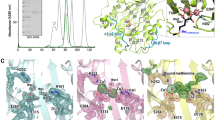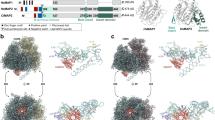Abstract
N-terminal methionine excision (NME) is the major proteolytic pathway responsible for the diversity of N-terminal amino acids in proteins. Dedicated NME components have been identified in all organisms, in all compartments in which protein synthesis occurs: cytoplasm, plastids and mitochondria. Recent studies have revealed that NME is regulated at various levels and plays an important role in controlling protein turnover. NME is essential in Eubacteria and lower eukaryotes and is the target of many natural and synthetic inhibitors. Such inhibitors have considerable potential for use in the treatment of various human diseases, from cancer to bacterial and parasitic infections.
Similar content being viewed by others
Author information
Authors and Affiliations
Corresponding author
Additional information
Received 19 December 2003; received after revision 21 January 2004; accepted 4 February 2004
Rights and permissions
About this article
Cite this article
Giglione, C., Boularot, A. & Meinnel, T. Protein N-terminal methionine excision. CMLS, Cell. Mol. Life Sci. 61, 1455–1474 (2004). https://doi.org/10.1007/s00018-004-3466-8
Issue Date:
DOI: https://doi.org/10.1007/s00018-004-3466-8




